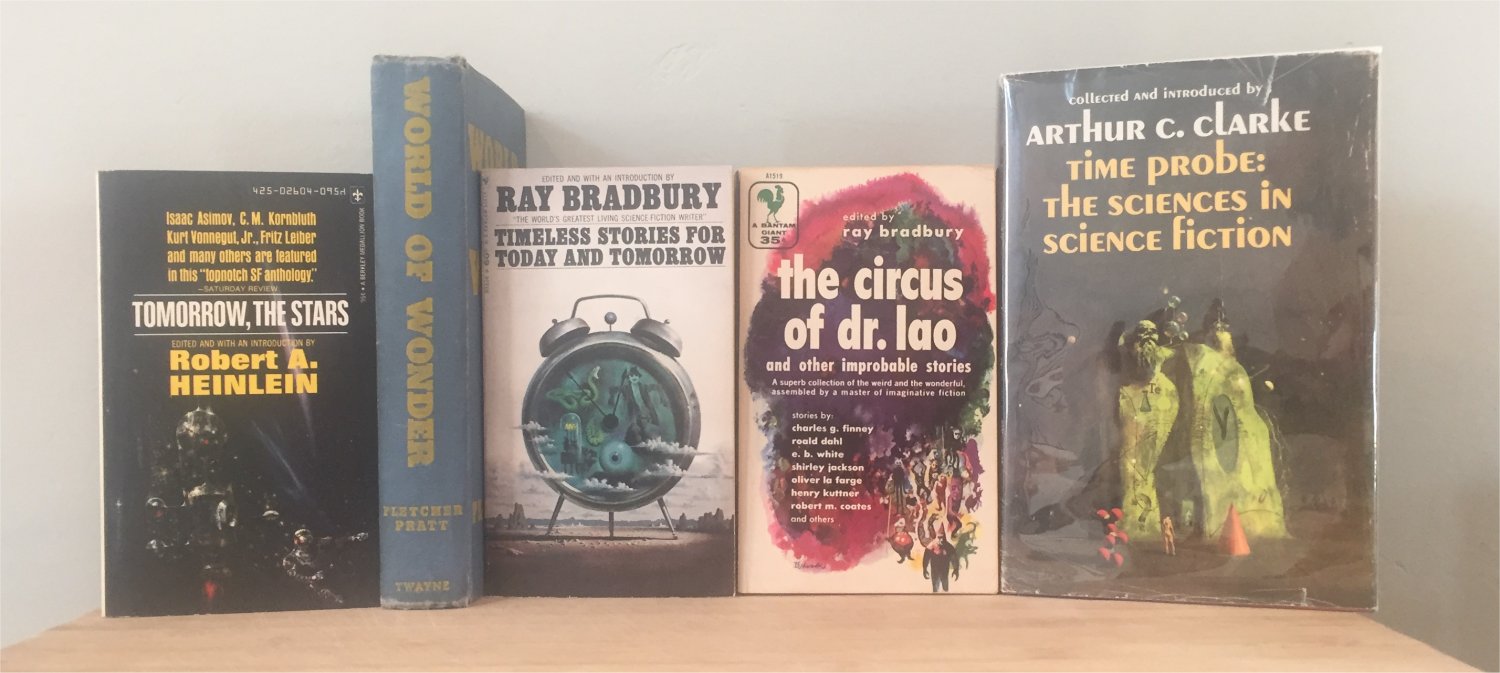Heinlein/Leinster/Pratt/Bradbury/Tenn/Sloane/Clarke : Anthologies by Authors
science fiction awards database

In the early 1950s publishers discovered a market for anthologies of science fiction stories for readers who did not followed the science fiction magazines. As professional editors like Groff Conklin and August Derleth produced their books, several prominent authors tried their hands at editing anthologies, or perhaps were recruited by publishers for their marquee value.
The mode of anthologies in this era was that editors, whether Conklin or Pohl or Merril or Heinlein, were out to find stories worthy of publication in books that were not already familiar to buyers of such anthologies -- that's why there are only a couple stories in this combination TOC that appear in more than one book.
The most prominent of these author-editors were Heinlein, Bradbury, and Clarke. (Asimov waited until the 1960s to turn his hand to anthologies.) Of these three, only Bradbury seems to have genuinely edited his two books; his introduction to Timeless Stories discusses his intent to find stories by authors who rarely write fantasy, and to find stories not already available in other anthologies. His second anthology reprints the entire Charles G. Finney 92 page short novel of the title (already published by Viking in 1935, and issued by Bantam as a separate volume in 1964 of 119 pp) and discusses the nature of fantasy, as opposed to science fiction, in the introduction.
The Heinlein volume is widely considered to have actually been edited by Doubleday editor Walter Bradbury along with consultants Judith Merril, Frederik Pohl, and Truman Talley; see isfdb and SFE's Heinlein page. Heinlein acknowledges all four in his introduction.
And Clarke's later 1966 volume, an anthology of stories about "the sciences in science fiction," is generally considered to have been ghost-edited by Robert Silverberg, whom Clarke significantly credits in his introduction; the cover and title page don't say "edited by" but rather says the book is "collected and with an introduction by" Clarke. 1966 was the year Silverberg began his run of theme anthologies for other publishers; and 1966 was perhaps the year Clarke arrived in New York City, where Silverberg lived, to begin work with Kubrick for what became 2001.
The others here, by Murray Leinster, Fletcher Pratt, William Tenn, and William Sloane, were apparently one-offs: one or two anthologies each by well-known authors of the time, who never became regular anthologists.
The photo includes 1st editions of the Pratt, the second Bradbury, and the Clarke.
The mode of anthologies in this era was that editors, whether Conklin or Pohl or Merril or Heinlein, were out to find stories worthy of publication in books that were not already familiar to buyers of such anthologies -- that's why there are only a couple stories in this combination TOC that appear in more than one book.
The most prominent of these author-editors were Heinlein, Bradbury, and Clarke. (Asimov waited until the 1960s to turn his hand to anthologies.) Of these three, only Bradbury seems to have genuinely edited his two books; his introduction to Timeless Stories discusses his intent to find stories by authors who rarely write fantasy, and to find stories not already available in other anthologies. His second anthology reprints the entire Charles G. Finney 92 page short novel of the title (already published by Viking in 1935, and issued by Bantam as a separate volume in 1964 of 119 pp) and discusses the nature of fantasy, as opposed to science fiction, in the introduction.
The Heinlein volume is widely considered to have actually been edited by Doubleday editor Walter Bradbury along with consultants Judith Merril, Frederik Pohl, and Truman Talley; see isfdb and SFE's Heinlein page. Heinlein acknowledges all four in his introduction.
And Clarke's later 1966 volume, an anthology of stories about "the sciences in science fiction," is generally considered to have been ghost-edited by Robert Silverberg, whom Clarke significantly credits in his introduction; the cover and title page don't say "edited by" but rather says the book is "collected and with an introduction by" Clarke. 1966 was the year Silverberg began his run of theme anthologies for other publishers; and 1966 was perhaps the year Clarke arrived in New York City, where Silverberg lived, to begin work with Kubrick for what became 2001.
The others here, by Murray Leinster, Fletcher Pratt, William Tenn, and William Sloane, were apparently one-offs: one or two anthologies each by well-known authors of the time, who never became regular anthologists.
The photo includes 1st editions of the Pratt, the second Bradbury, and the Clarke.
- Tomorrow, the Stars, Robert A. Heinlein, ed. (Doubleday, 1951) [isfdb]
- Great Stories of Science Fiction, Murray Leinster, ed. (Random House, 1951) [isfdb]
- World of Wonder, Fletcher Pratt, ed. (Twayne, 1951) [isfdb]
- Timeless Stories for Today and Tomorrow, Ray Bradbury, ed. (Bantam, 1952) [isfdb]
- Children of Wonder, William Tenn, ed. (Simon & Schuster, 1953) [isfdb]
- Space, Space, Space, William Sloane, ed. (Franklin Watts, 1953) [isfdb]
- Stories for Tomorrow, William Sloane, ed. (Funk & Wagnalls, 1954) [isfdb]
- The Circus of Dr. Lao and Other Improbable Stories, Ray Bradbury, ed. (Bantam, 1956) [isfdb]
- Time Probe: The Sciences in Science Fiction, Arthur C. Clarke, ed. (Delacorte, 1966) [isfdb]
Combined Contents by Author and Title
Poul Anderson
-- Children of Wonder
-- Children of Wonder
-- Children of Wonder
-- Stories for Tomorrow
Copyright 2012 - 2026 by Mark R. Kelly and the Locus Science Fiction Foundation. All rights reserved.